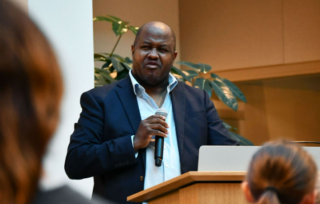HSJI Students and Staff inspired to value passion over money in work

Erick Johnson speaks to HSJI 2023 students. Photo contributed by Emma Pearce.
Erick Johnson’s words reverberated through all in attendance at the Indiana University High School Journalism Institution(HSJI) as students and teachers alike attentively listened to Johnson describe the trials, tribulations, and joys of being a journalist. He highlighted the obligation people have to pursue a purposeful career and make a difference.
“Be the voice for the voiceless,” Johnson said.
One of these many inspired students, rising senior Lauren Kopka, attends Hamilton Southeastern High School and aspires to be a journalist. She said she has a passion for telling the stories of others and views it as a selfless career.
“I just find it exhilarating and also gratifying,” Kopka said. “You definitely have to put the needs of your community on your staff and like your boss and your editor before you.”
Kopka, like many others seeking to go into journalism, acknowledges that the money in journalism is not the best and has even made her hesitant at times. However, she finds that while the monetary compensation could be better, being able to do what she loves triumphs.
“Even if I am a reporter or journalist and I can’t afford a $5 Starbucks, journalism feeds me, I love it and I’m passionate about it,” Kopka said.
Kopka expands on Johnson’s point about how a fulfilling career is much more meaningful than one that simply pays well. She notices how many people around her have pursued careers that pay well, but do not necessarily satisfy them and how she views them as cautionary tales.
“I’m lucky I’ve found something like this because like a lot of people do go their whole lives and never find it,” Kopka said. “I’m so passionate about it that money does not seem like an issue right now.”
In addition to this Kopka looks up to Johnson and his goal of uplifting those who need it and making a difference for them.
“It really hit me and it felt like he was speaking to me,“ said Kopka. “I want to uplift other people’s stories and publish real journalism about real people.”
To extend this, Kopka was incredibly moved by Johnson’s call to action and even rethought her goals for the future and aimed her focus more to hyper-local journalism.
“It caused me to rethink my goals of journalism,” said Kopka. “So I want to be like a Pulitzer Prize-winning, New York Times journalist, or is my calling more towards my local community and the voices that are there.”
Johnson’s message touched the hearts of many students and teachers alike. Southport English teacher and journalism advisor Mike Klopfenstein felt particularly strongly about Johnson’s message because of his passion as a teacher.
“I thought what Eric said last night about finding something that you’re passionate about and finding something that you think the world needs was spot on,” Klopfenstein said.
He said teachers, as a profession, are not paid as much as they should be for their incredibly important words, however, others like him are content knowing they do work that touches the lives of their students.
“But no teacher that I know goes into it for the money,” said Klopfenstein. “I love the fact that I can get in my car and leave and say I helped people today. I helped kids, sometimes their individual kids”
Klopfenstein takes great pride in embodying Johnson’s message about fulfilling a true and impactful purpose in life as opposed to simply seeking money. He found it integral to his life to be able to do work he and others value.
“Just the ability to say what I do is important,” said Klopfenstein. “What I do helps the people around me and makes life better for them.”
Klopfenstein felt Johsnon’s message about using one’s voice was extremely powerful. He said in the past we have given a voice to a particular group of people while robbing others of a voice and this undermines the value of people. He emphasizes the importance of people like journalists who are willing to be that voice regardless of the money they receive.
“We are all people in fact, and more of us need to pay attention to these people that are voiceless,” said Klopfenstein. “In fact, it is our job to help people.”

